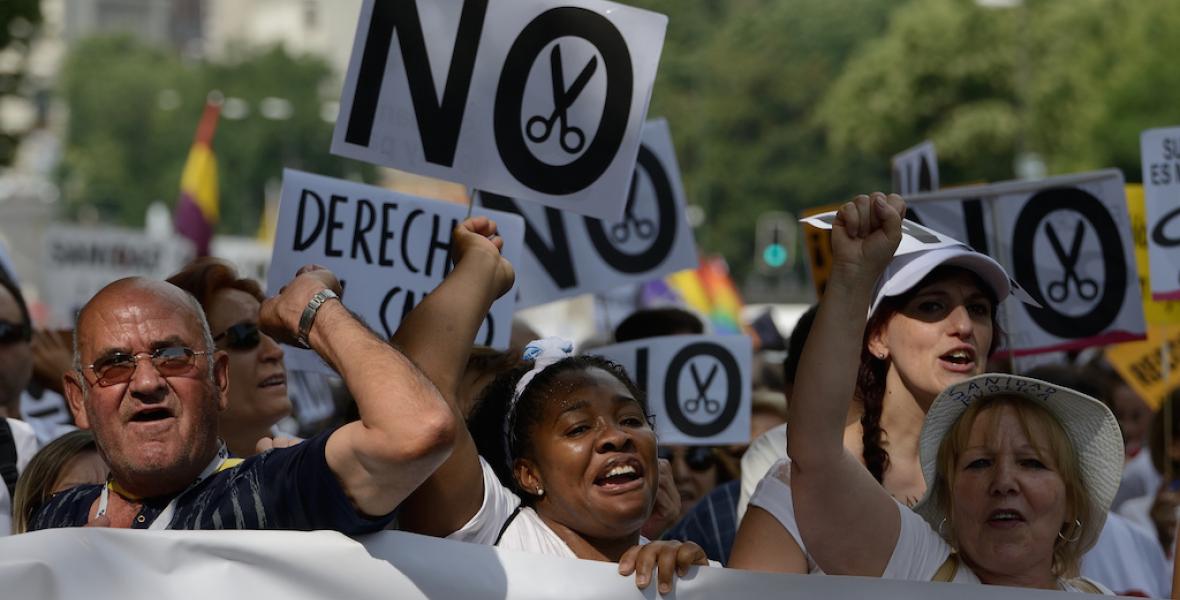June 21, 2018
 In 2012, the Spanish government in power approved Royal Decree Law 16/2012, drastically reforming the national health system, with the justification that limiting universal access to services was necessary to ensure the healthcare system’s sustainability during the financial crisis. Thus, it excluded publicly funded healthcare services for adult immigrants with irregular administrative status, established copayments for medications, adversely affected the elderly and other people with the fewest resources, and imposed other administrative barriers that harmed precisely the groups most impoverished by the crisis. The supposed fiscal savings the norm was supposed to generate never emerged.
In 2012, the Spanish government in power approved Royal Decree Law 16/2012, drastically reforming the national health system, with the justification that limiting universal access to services was necessary to ensure the healthcare system’s sustainability during the financial crisis. Thus, it excluded publicly funded healthcare services for adult immigrants with irregular administrative status, established copayments for medications, adversely affected the elderly and other people with the fewest resources, and imposed other administrative barriers that harmed precisely the groups most impoverished by the crisis. The supposed fiscal savings the norm was supposed to generate never emerged.
By contrast, under this austerity policy, around 870,000 people lost the health card that provided them with access to healthcare services. The mortality rate in the immigrant community with irregular status increased by15 percent over a three-year period, there was a reduction in primary care, and a greater use of emergency services, as well as multiple documented cases of illegal barriers to access to emergency services and maternal and child care. As in the majority of contexts in which the imposition of fiscal austerity dismantles basic rights and social protection, the Spanish government converted a financial crisis into an unprecedented human rights crisis.
Since the government adopted the healthcare exclusion six years ago, CESR, together with a collective of Spanish organizations, in particular Médicos del Mundo, Red ACOGE and Amnesty International in Spain, began a strategy to challenge the idea that austerity must prevail over peoples’ essential rights. These actions were designed to produce solid evidence of the impacts of this austerity measure, put the problem in the view of national, regional, and United Nations human rights mechanisms, and thus expand the sphere of normative protection for economic and social rights in the face of austerity policies, proposing less harmful proposals. After sustained action for more than half a decade, this collective action of CESR and its Spanish counterparts has generated consensus and laid the foundation for the new Spanish government to affirm without delay its decision to reestablish the system of universal access to healthcare.
The former Spanish government that has just been removed from power due to corruption abdicated its human rights obligations and ignored the recommendations issued by relevant mechanisms of the Council of Europe, United Nations treaty monitoring bodies, and various special human rights mechanisms. During Spain’s most recent periodic review before the Committee on ESCR in 2018, the evidence produced was overwhelming, and the Committee’s requests forceful, demonstrating that RDL 16/2012 did not meet the requirements for it to be permissible under the International Covenant on Economic, Social and Cultural Rights (ICESCR). Thus, the reestablishment of universal healthcare in Spain again aligns the country with its obligations regarding this right. The aggressive legal battle the previous administration pursued to prevent autonomous communities in Spain from adopting measures to mitigate the impacts of RDL 16/2012 was effective in several court decisions, including decisions of the Constitutional Tribunal, eroding the status of the right to health and economic and social rights in Spanish jurisprudence.
The new government has launched a consultation process with Spanish civil society to repeal RDL 16/2012. It is an excellent start CESR observes with optimism. We trust in and will work together with our counterparts in the country, so that this process results in a norm coherent with the principles and obligations of the ICESCR. CESCR subscribes to the list of requests of its allied organizations with respect to complementary measures the State should adopt to correct and revert the negative impact of RDL 16/2012 in various spheres of health and for different groups of Spanish society.
This result of the sustained fight to reestablish the right to health in the context of austerity policies is an example that illustrates the importance and need of a sustained and consistent accountability strategy at the national, regional, and international levels to reform unjust economic policies and reverse the mantra of austerity in Spain and other parts of the world, such as Brazil, Egypt, South Africa,and Latin America, contexts in which CESCR continues to work.
Related: